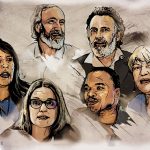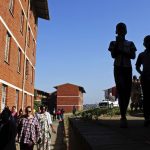Eastern Cape activists accuse police of excessive force
Residents fed up by the lack of jobs and services have accused the police of using excessive force against them and allowing local businesspeople to use the SAPS to settle factional ANC battles.
Author:
24 June 2019

A sharp scar marks the left side of Vuyo Sibulali’s neck. It is one of the many he claims were inflicted by members of the Public Order Policing Unit from Lusikisiki in the Eastern Cape to silence him and fellow activists who are vocal about the lack of development in the area.
The 32-year-old lives in the village of Ndakeni, 158km from Mthatha and with a population of 1 987, according to the 2011 census.
Activists from the sprawling village have accused the police of using excessive force to muzzle residents who are fed up with joblessness and living without access to water.
They have also accused local ANC leaders and certain businesspeople in the area of using members of the South African Police Service (SAPS) to settle factional political battles.
Related article:
Ndakeni village is governed by the Mbizana Local Municipality, which administers 31 wards and has an overall population of 48 447. The village is made up of rondavels and concrete structures decorated in bold colours on rolling green hills.
Sibulali, a father of three, told New Frame he was allegedly assaulted by members of the Public Order Policing Unit after addressing a rally on 11 January.
The rally was a prelude to the shutdown of the Dudumeni Quarry, owned by construction company Masakhane Project Manager, for allegedly failing to fulfil its social responsibility commitments to the residents of the area.

Promises made
In operation since 2014, some of the promises Masakhane made included constructing access roads, hiring workers from the area and building a bridge to lessen the risk of pupils from the Camagu primary school drowning or missing classes during floods.
A resident of the village for more than eight years, Sibulali adjusts his beanie and points to the area where he and four other activists were allegedly stopped and assaulted by the police.
Not far from the area, a towering supermarket overlooks the taxi station, where street sellers offer amagwinya (vetkoek) and food steams in the winter sun.
Apart from the busy tar road dividing it, Ndakeni is a quiet, agricultural village.
Allegedly pepper sprayed, handcuffed and beaten with a rifle butt, Sibulali was the only activist detained that day. “The police slapped me several times until I fell to the ground. They said they are going to teach me a lesson because I talk too much.”
He says the assault happened in full view of villagers, including schoolchildren. The incident led to residents at the end of January boycotting the final voter registration weekend for the 8 May national elections.
Living in fear
Sibulali is not the only activist to have fallen prey to excessive police force. Fellow activist Mandoleli Ndesi says the use of live ammunition and hand grenades to disperse protesters is common in the village.
The breadwinner for his family of five, Ndesi told New Frame that some of his family members have been intimidated by the police to muzzle his activism in the area.
Ndesi, 40, was with Sibulali and two others when the police allegedly assaulted the four of them. “We were kicked and pepper sprayed, but Vuyo got the worst beating. The police were targeting him.”
Detained on a Friday, Sibulali told how, despite being badly wounded, police officers refused to take him to the hospital until Saturday afternoon. “I have never experienced pain like that before.”
New Frame has Sibulali’s medical report and pictures of the multiple wounds he says the police inflicted.
He now lives in hiding, following several death threats, and says they all live in fear.
During the arrest, Sibulali was charged with resisting arrest and assaulting a police officer. Although the charges were dropped in April, Sibulali is seeking justice through the Independent Police Investigative Directorate (Ipid).
Ipid spokesperson Moses Dlamini confirmed that Sibulali had reported the incident to the authority, saying “the investigation is still ongoing”.
Port Saint Johns police spokesperson Nozuko Handile told New Frame Sibulali’s case was withdrawn and the docket was filed.
Police involvement in deaths
The youngest of the four activists is 27-year-old Funani Gqibela. Unemployed and frustrated by the lack of basic services, Gqibela frowns when he talks about incomplete projects in the village, some older than a decade.
Like many other young people who loiter along the village pathways, Gqibela still lives with his parents and says he worries about getting a job to help his family. He lives with six family members in an RDP house.
According to the Ipid 2017-2018 annual report, 436 reported incidents of deaths as a result of police action were reported, and 201 incidents of deaths in custody cases were lodged.
The report found that members of the police service were implicated in 217 incidents of torture and 3 661 incidents of assault.
In the Eastern Cape, police officers were involved in 28 incidents of death in police custody and 55 incidents of death as a result of police action.
ANC factional battles
In November 2011, the shooting and killing of Mbizana ANC councillor Monwabisi Mfingwana prompted a by-election. Although Mfingwana is said to have been killed during a hijacking, Sibulali says his death was politically motivated.
Sibulali says the election of current Mbizana Ward 8 ANC councillor Tshepo Somadlangathi was marred by factional squabbles and violence.
He further accused the local police of being in the pockets of both Somadlangathi and Mbizana Local Municipality mayor Daniswa Mafumbatha.
Related article:
The lack of water, housing and jobs, and incomplete infrastructure projects, fuelled protests in Ndakeni last year. Villagers say the protests ended in violence, with many detained and released on hefty bails.
Somadlangathi refuted the allegations and told New Frame local government has recently finished building an Early Childhood Development (ECD) centre and a stadium for villigares of Ndakeni. He denied using police to squash political opponents and said “Police only got involved when they had to disperse protestors”.
The councillor dismissed claims as coming from a group of people who have political ambitions.
Quarry blasts damage homes
Vuyani Busoko, 60, is one of the villagers who was not relocated to a nearby area to make way for the quarry that borders his four-roomed house.
Busoko criticised Masakhane for failing to fulfil the promises it made to residents and did not vote on 8 May in protest against the current ANC leadership in the area. “What’s the point of voting,” he shrugs.
Busoko says the explosives used in the quarry are causing damage to the homes of those still living alongside it. “People’s homes are cracking.”
Although Sibulali is convinced the quarry did not fulfil its social responsibility commitments, Masakhane founder and quarry owner Ayanda Notshweleka rubbished the allegations and said 25 of the 180 people working at the mine live in Ndakeni. Notshweleka told New Frame that the quarry had built roads in four villages, including Ndakeni and neighbouring Dudumeni, and “the company has appointed an engineer to design the bridge.”
Camagu is built on a hill and to get there pupils have to cross a donga, which floods in times of heavy rain. Masakhane had promised to build a bridge here.
Notshweleka said those who lived close to the quarry were relocated and accused Sibulali of discrediting his name to pursue his ambition of becoming the next councillor for Ward 8.

National elections
Ndakeni inhabitants vowed initially to protest against the national elections to show their disgruntlement.
Ndesi told New Frame that the villagers hoped that by threatening to boycott the elections, the local government would tackle the water, sanitation and unemployment problems in the area.
“You can see there is no water here, no sanitation. We drink water with cows … When it floods, the river water is dirty and only locals who can afford to buy tanks are able to have access to clean water,” he said.
When the time came, however, residents made a collective decision to vote. “The community gave them another chance to govern,” said Ndesi.
The Eastern Cape had a 59.51% voter turnout.
“We don’t want the ANC to play the people. We want the old ANC to be revived and serve the people like it has promised, but here the people are not served,” he says.
Police and politicians working together?
Ndesi also suspects that the local police are allegedly working with ANC leaders in the area. According to Ndesi, funds to build RDP houses in Ndakeni were redirected to neighbouring villages, fuelling anger in the village.
“We want to see change, development in our villages. One thing that makes us so angry is that we are told that we had been allocated a budget for RDP houses, but because we did not vote for our ward councillor he took those houses to other neighbouring villages and he says he is happy because those people voted for him. We can’t vote for you when you don’t serve us.” Ndesi explained.
He also accused the local police of shooting residents with live ammunition during peaceful demonstrations. “They shot at us randomly and use grenades to disperse the crowds.”
The silencing of activists is a norm, according to 31-year-old activist Nomdlembu Mawethu. In December 2017, activist Bogile Hlambelo, who lived in Ward 6 in Mbizana, was reported missing. Mawethu says that more than a year later, Hlambelo has still not been found.
New Frame was unable to confirm whether or not a missing persons case was lodged in relation to Hlambelo.

Rural municipality
Mbizana Local Municipality communications manager Thamsanqa Cwivi told New Frame that a system to pipe water to villagers has not happened, and that “it is still in the planning phases”. But the construction of Ludeke Dam has been completed. Mbizana municipality built the R250 million dam, about 100km from Ndakeni, as part of plans to supply water to the area.
Cwivi said the authority is a rural municipality struggling with job creation because of a lack of viable industries in the area.
Addressing service delivery challenges facing residents, Cwivi said Ndakeni is one of the villages that the Mbizana mayor planned to visit to discuss concerns raised by residents.
The spokesperson said he was not aware of the use of the police to settle factional battles in the ANC.
The Eastern Cape has the highest unemployment rate of all the provinces at 45.8%.
The municipality is currently trying to create job opportunities within the framework of the Expanded Public Works Programme, which provides temporary work for the unemployed. Cwivi says this is only a “short-term” solution for the province’s employment woes.


